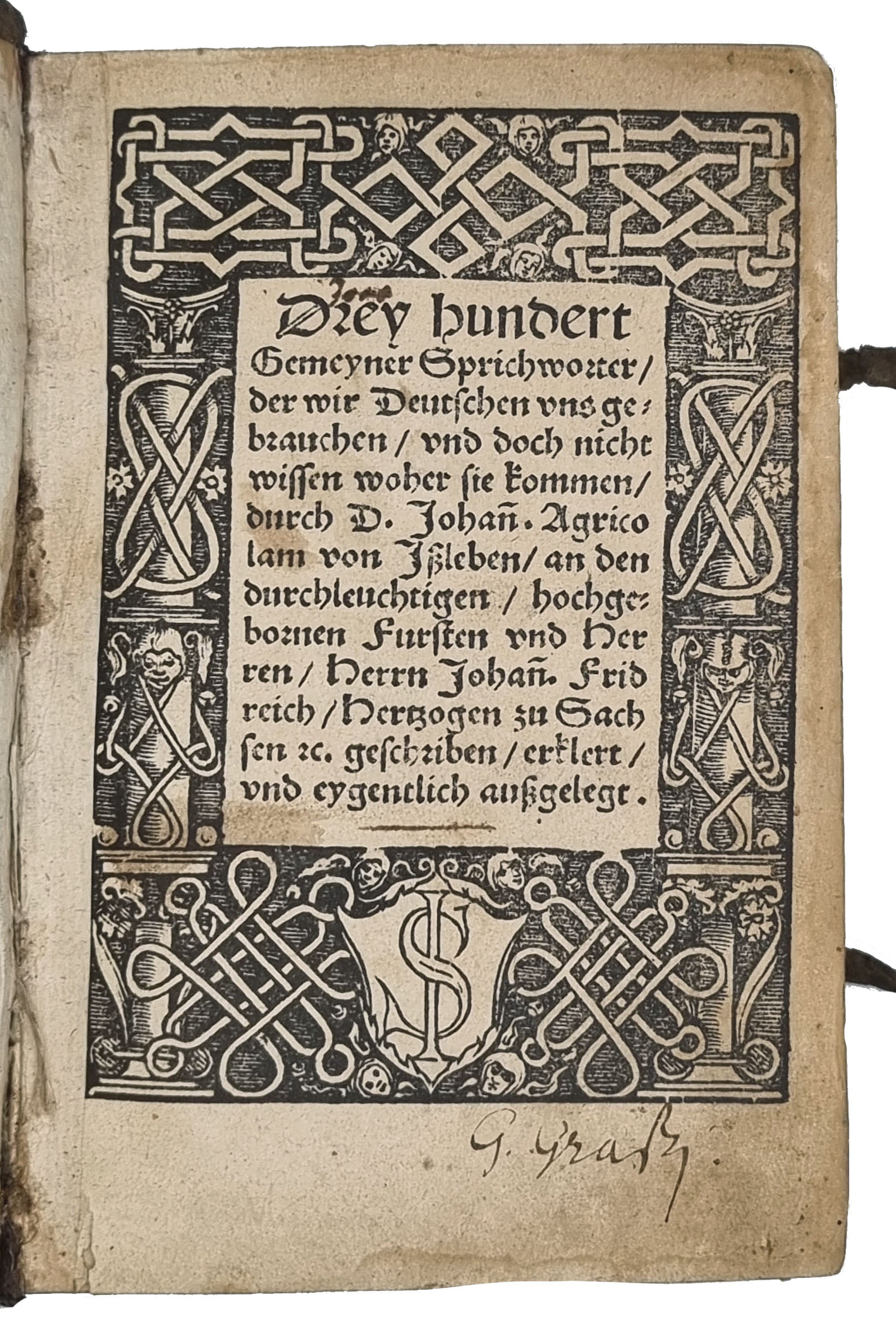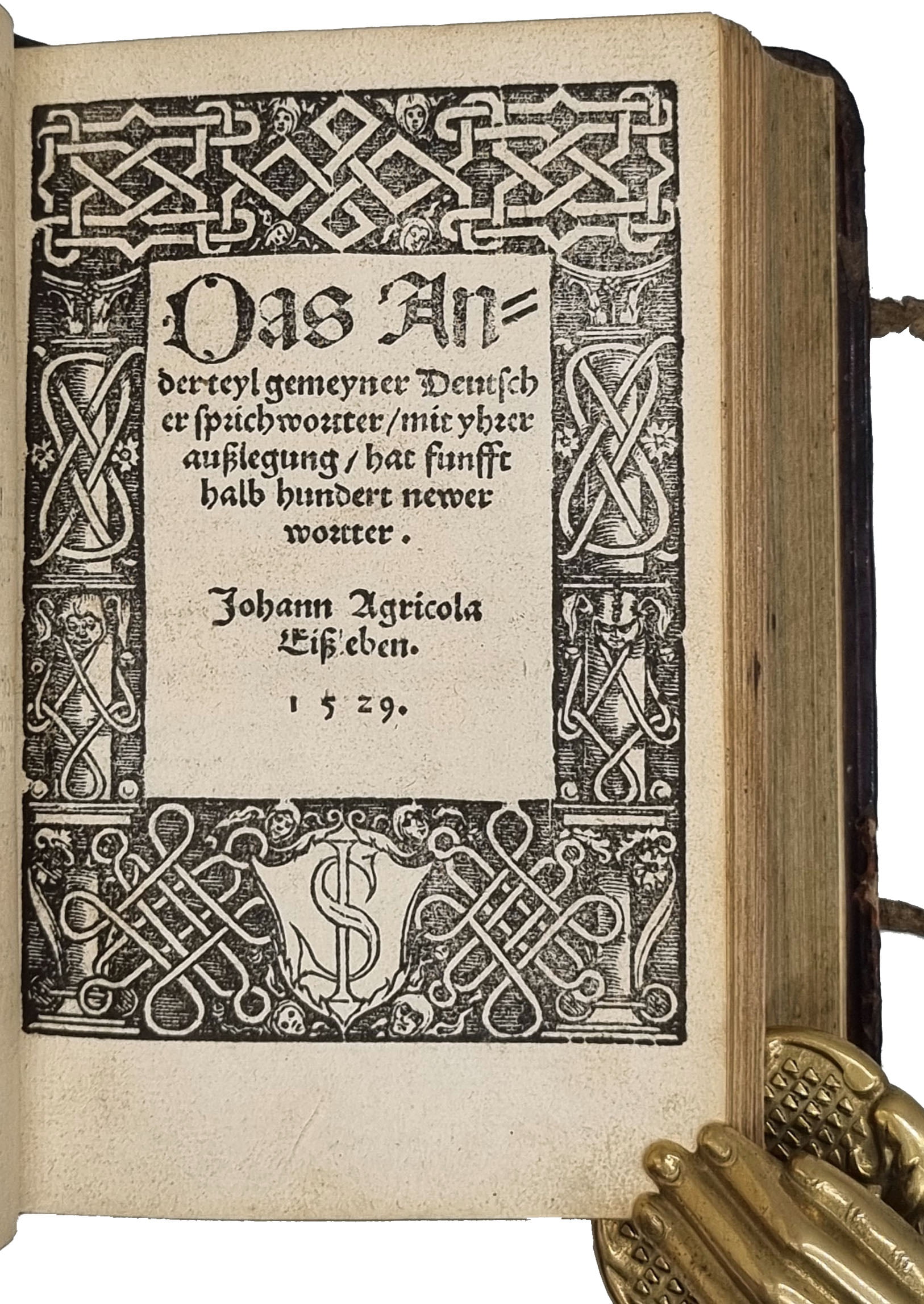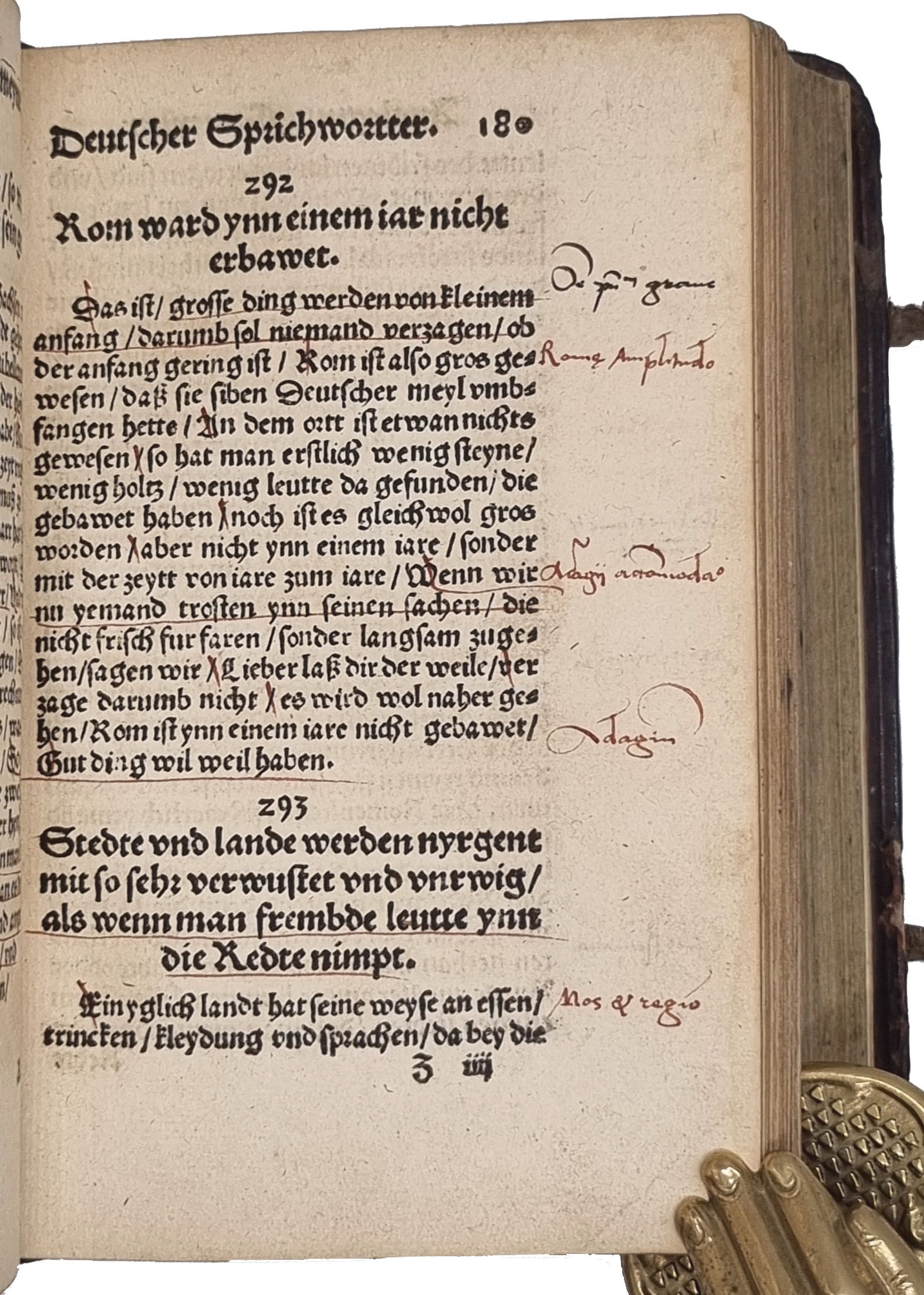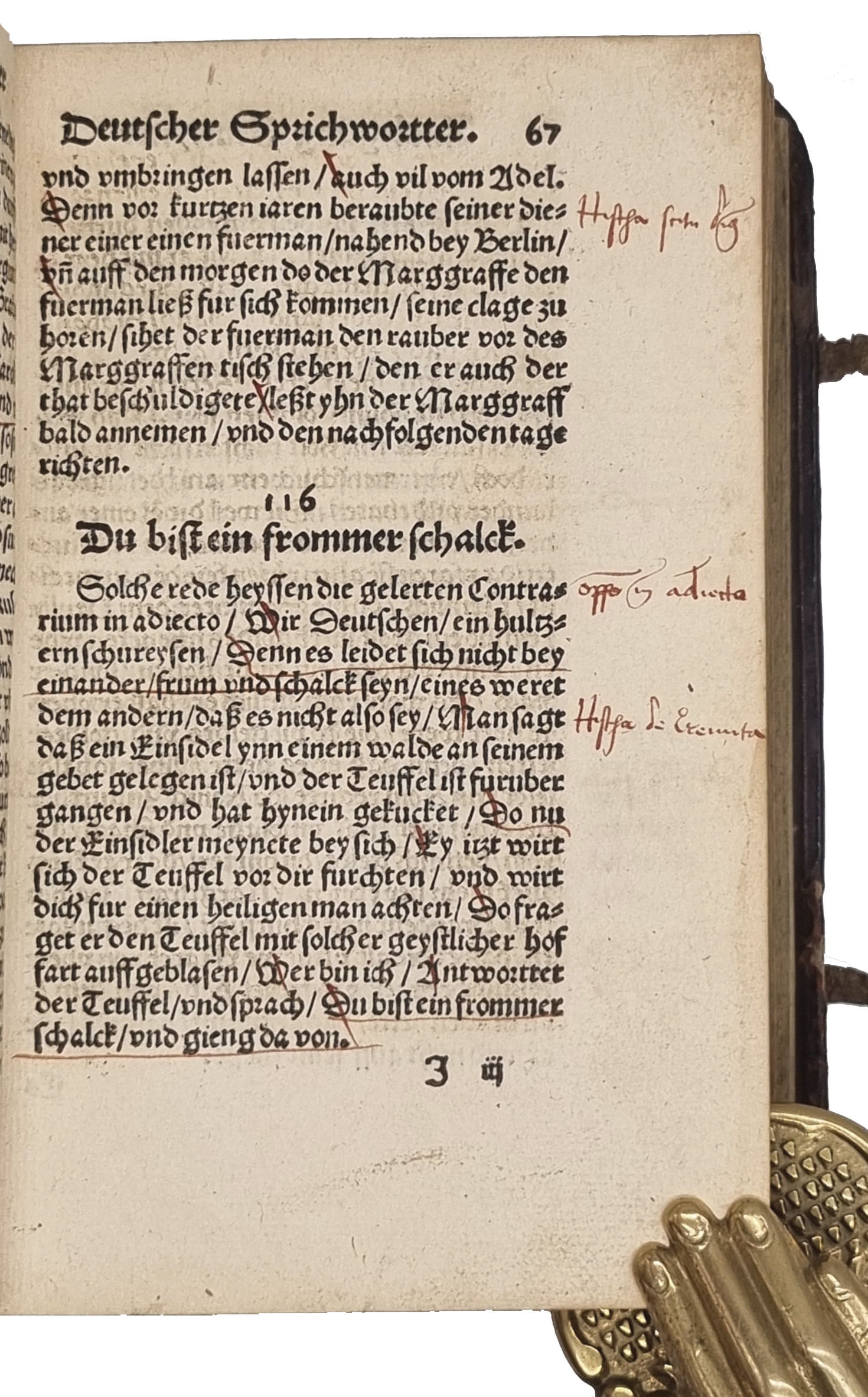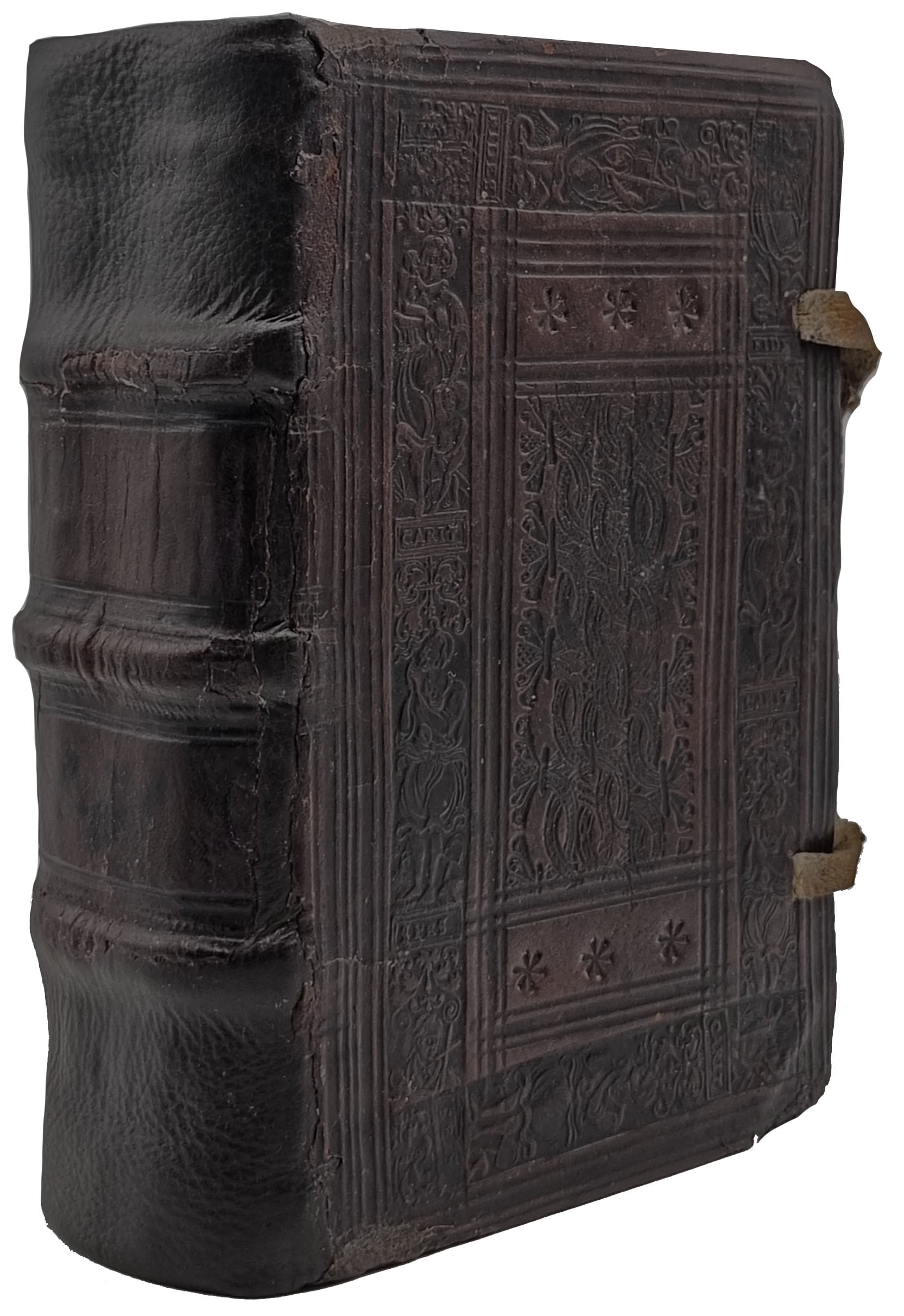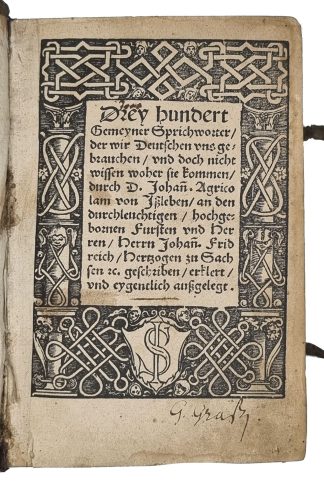AGRICOLA, Johannes.
EXTENSIVE CONTEMPORARY ANNOTATIONS
Drey hundert Gemeyner Sprichworter. [with] Das Ander teyl gemeyner Deutscher sprichworter.
[Hagenau, Johann Setzer, 1529].£5,950.00
FIRST EDITION of second work. 8vo. 2 in 1, separate titles, I: ff. [12], 184; II: ff. [16], 248. Gothic letter, occasional Greek. T-ps within charming woodcut border with interlacing ribbons, columns, jester’s heads and arms with printer’s monogram, couple of large decorated white-on-black initials. I: slight age yellowing, intermittent minor light water stain along outer edge, occasional finger-soiling to lower outer blank corner, two small light ink splashes to first title, extreme lower outer blank corner of b2 torn away, II: the odd mainly marginal ink mark or light smudge, last verso a little dusty. Very good copies in slightly later (late C16) Germanic dark calf, expertly rebacked with central portion of original spine onlaid, remains of ties, double blind ruled to a panel design, outer border with blind roll of Spes, Fides and Caritas, central panel with blind rolls of interlacing palmettes and blind-stamped stylized rosettes, minor sympathetic repair to three corners (a bit rubbed), later autograph ‘G. Grassj’(?) at foot of first t-p, C16 ms. ‘Sum M. Joh[annes] Fischeri’ to blank verso, extensive contemporary ms. marginalia in Latin and German, maniculae, occasional rubrication and underlining in red or black-brown ink, a few more annotations in black-brown ink in an early to mid-C16 and a late C16 hand (the odd one trimmed).
Carefully used copies, charmingly bound and extensively annotated, of the first and second part of this important early collection of German proverbs – ‘one of the major literary documents of the Reformation’ (Gilman, p.78). The first part – here in one of 5 first editions published in 1529 (priority not established) – comprises 300 proverbs; the second work, first published here, has another 450. In these two works, Johannes Agricola (1494-1566), a German Protestant Reformer acquainted with Luther, combined the medieval tradition of vernacular proverbs with Erasmus’s humanist Latin ‘Adagia’. At the same time, he ‘polemized’ the content and gave it a different form – using the genre of the moralizing exemplum – so as to transmit Reformed ideas (Gilman, p.78). Indeed, each numbered proverb, accompanied by a Latin or Greek version, is followed by a short explanation in German, presented as a traditional harmless commentary with moral intent, but actually imbued with Reformation and nationalistic polemics, including biographical details of the early Reformers and observations on contemporary German economics and politics.
The extensive annotations in this copy provide stellar evidence of ways in which contemporary Reformed readers engaged with Agricola. E.g., the annotator glossed ‘This is what false tongues and teachers have done’ with ‘Thomas Müntzer’, an early Reformer who eventually rejected Luther’s ideas. He highlighted a passage on Luther’s difficult position in 1518, glossing it with a reference to his work (1520) on the ‘Captivitas Baylonica’ of the Roman Church. Other episodes from Luther’s career are glossed with a date and ‘M L’. He was interested in Agricola’s account of the fortunes and activities of the merchant Jakob Fugger, ‘who pushed trade so hard like nobody in living memory’, and who obtained with a bribe a monopoly over Portuguese spices (glossed with ‘Monopolia p[ro]hibita’ by our annotator). Clearly interested in trade, he glossed with ‘Emporia Germanica’ a passage on commercial centres, i.e., Antwerp, Frankfurt and Leipzig. He also marked references to sources, e.g., Erasmus and Huss, and added verse in German from his own personal knowledge. The slightly later annotators were more interested in the proverbs per se.
I: Huntington, Princeton and Penn copies recorded in the US. VD16 A 956; USTC 641398; BM STC Ger., p.9; Graesse I, p.44 (records a first ed. of 1528). II: Only Penn copy recorded in the US. VD16 A 957; USTC 626816; Graesse I, p.44. Not in BM STC Ger. S.L. Gilman, ‘Johannes Agricola of Eisleben’s Proverb Collection (1529)’, Sixteenth-Century Journal 8 (1977), pp.77-84; P. Hess, Resisting Pluralization and Globalization in German Culture, 1490–1540 (2020).In stock


